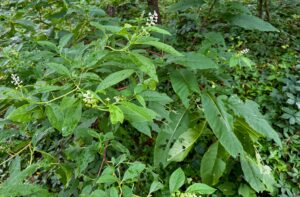
By Mary Reid Barrow
Give pokeweed a break!
The big wild native with its long leaves and purple berries is not appreciated by many gardeners, mainly because birds love the berries and spread pokeweed seeds round the yard.
Not only do birds really love those berries in late summer and fall but pokeweed also has some fun stories to tell from its past.
Though pokeweed is poisonous to eat, it isn’t so poisonous that people didn’t know how to get around that obstacle in years past. They gathered a mess of young pokeweed leaves, boiled them twice with a change of water and served them up the same way folks ate, and still eat, other greens like spinach, kale, or Hanover salad.
Pokeweed salad was so popular that it was celebrated in song, “Poke Salad Annie,” which Elvis Presley later made into a hit.
And if that isn’t enough, for a while pokeweed was known as Polkweed, after President James K. Polk. Back in the 1840s, his supporters picked the big, long mature pokeweed leaves in early fall and wore them on their lapels like campaign buttons.
I know beauty is in the eye of the beholder, but I love to look at pokeweed. In early summer it produces tiny white blooms on little sprays. I have heard that hummingbirds will nectar on them.

The blooms turn to bright green little berries which then become a brilliant deep red along with the stem, on their way to turning purple. The colors are brilliant enough that the berries were once used as dyes. And these berries are what birds love late summer well into fall.

The dark green leaves nourish the caterpillars of the giant leopard moth. The dark and fuzzy caterpillars are akin to wooly bear caterpillars. The giant leopard moth is a big, striking looking white moth with black spots and circles.
Pokeweed is an annual so when you see it popping up in areas of your yard where you don’t want it, just pull it up. When young, you can pop it out of the ground easily.
But try and let one little patch of pokeweed be in an out of the way spot. Enjoy its big flamboyant leaves and purple berries. Watch the birds dine, search for its caterpillars and think of all the stories it has to tell.
Food for the birds and food for thought makes pokeweed a plus in my book.